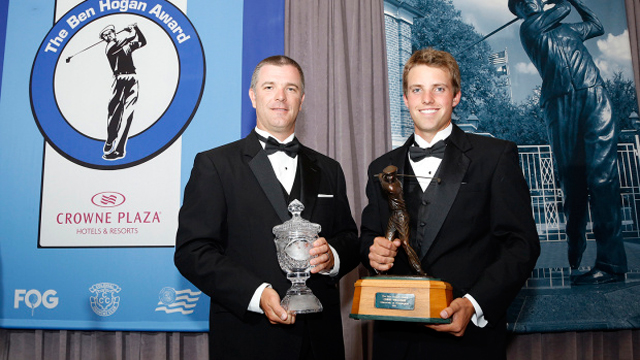NEWS
Williams, top-ranked amateur, ready to lead Washington into NCAA finals

SEATTLE -- When Chris Williams found out he was the No. 1-ranked amateur golfer in the world, it came in the same way he's learned about many of the other accolades in his career.
Someone else told him.
''It was when my buddy from back home who checks them daily told me,'' Williams said. ''I have no idea how the rankings work.''
Meet the quiet, unassuming, top-ranked amateur golfer in the world, who doesn't fit the mold of a young golfing star from a warm-weather climate. Williams comes from a college town of about 25,000 on the Washington-Idaho border where usually four months a year the golf course is covered in snow. He has blossomed into the top amateur in the world and the Ben Hogan Award winner playing at Washington.
He'll head to the NCAA championships next week in Atlanta trying to cap his college career with one more victory. But just getting to this point is really the story behind Williams.
''Chris is absolutely an anomaly,'' Washington golf coach Matt Thurmond said.
Star golfers simply don't come from Moscow, Idaho. They don't grow up dreaming of playing baseball – to the point that Williams still uses a 10-finger grip on his clubs rather than a traditional interlock – only to start taking golf seriously as a teenager.
Yet that's the foundation from which Williams has grown from a shy teenager into the second Huskies golfer, along with Nick Taylor, in the past three years to be ranked No. 1 in the world and be the Hogan Award recipient.
''Our program has been fortunate enough to have them playing for us,'' Thurmond said. ''I would like to think we helped them. We didn't screw them up, I guess. But they deserve all the credit themselves.''
Williams never had golf forced on him. Moscow will never be considered a hotbed of anything other than lentils, a jazz festival and farmland. That made life a little boring for Williams, who gravitated to the golf course. As a teenager, Williams gave up other sports, including his love for baseball, and focused specifically on golf.
Consider it the one advantage of growing up in a small town that for most of the summer Moscow was vacated. Williams could walk out to the course at the University of Idaho and play whenever he wanted, however he wanted.
Instead of sitting on the range and hammering buckets after buckets of balls, Williams had the course to himself. If he wanted to drop a half-dozen balls from 150 yards and shoot them from six different angles at the pin, that was his prerogative. He would regularly spend six to eight hours on the course as a teen hitting all the shots he wanted.
''You can stand on the range and hit a 9-iron 140 yards all day. But being able to hit different shots and see how I would react on the green was so much more beneficial than just hitting that same shot over and over and over again,'' Williams said. ''And you can only do it for so long. It gets boring. It's fun to hit six balls and see how close you can get each one of them, and that's kind of how I looked at it.''
Even though he took on golf late as his primary sport, Williams immediately found success. Granted the competition wasn't the strongest, but Williams quickly became known in the Northwest. He won four state high school titles in Idaho, but his only exposure nationally was playing in a few tournaments in Southern California before he got to Washington.
Getting Williams' personality to show, that was one of Thurmond's toughest tasks. Thurmond had to essentially threaten to pull a scholarship offer just to get Williams to respond to his emails in the recruiting process.
''As a junior golfer I don't want to say he lacked confidence but he really kept to himself. He was shy. He wore these big sunglasses and wore them all the time with a hat down and didn't talk to anybody,'' Thurmond said. ''So no one really knew him. He just did his own thing. Now he's just much more outgoing and comfortable with himself, it seems like.''
Once he got to Washington, Williams flourished. He won two tournament titles as a freshman and placed in the top 10 individually at the NCAA championships. He's gained 25 yards off the tee and spent each year focusing on improving one area of his game. Two years ago, it was his short game. Last year it was his putting.
Amazingly, Williams has retained his No. 1 ranking since last August without winning a single tournament during his senior year; six top-five finishes have helped keep his world ranking solid. That's why next week's NCAAs are of such importance. He doesn't want to end his college career with a winless season.
''I feel like if everything comes together it could happen, but that's where the sights are set,'' Williams said.
What happens after the NCAAs is still to be determined. Because of his world ranking, Williams has entry into the U.S. Open at Merion and the British Open at Muirfield secured as long as he retains his amateur status. Williams is staying mum on how the summer will play out, but even with a pro career on the horizon, he's still humble about his roots.
''It's awesome when I'm on the tee and they announce I'm from Moscow, Idaho. People are like 'Where the hell is that. Is that in the Midwest?' Nobody has any idea where it is,'' Williams said. ''A lot of guys come from LA, Texas, Florida. I love coming from Idaho. Kind of exotic, I guess, for golf.''
